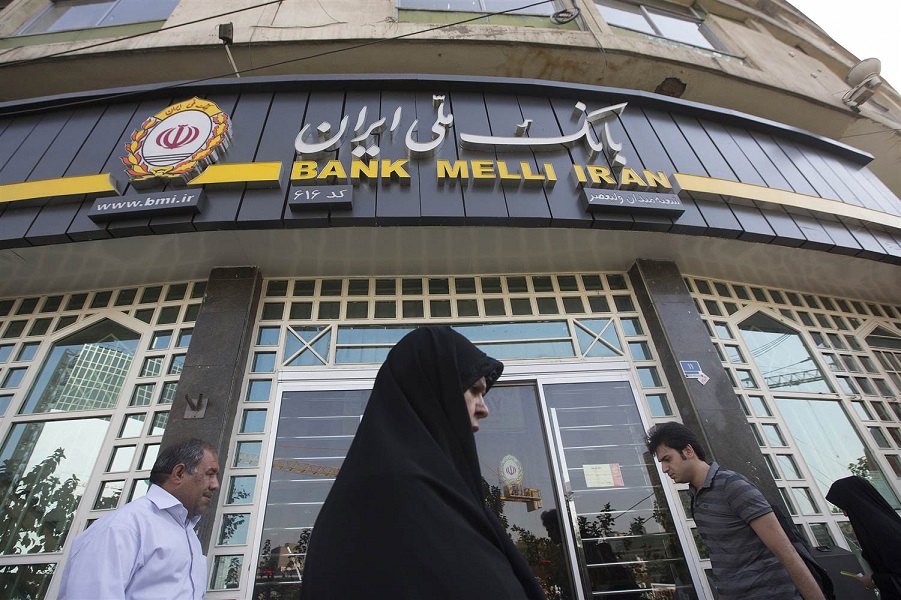Iran is aiming to strengthen its financial ties to global capital markets by opening domestic bank branches overseas.
Just last week, Iran’s privately owned Saman Bank opened a representation office in Rome, launched after the bank obtained the required authorizations from the central banks of Iran and Italy. A contract signed between Italy's Export Guarantee Funds and Bank Saman established an exclusive credit line for the Iranian bank, whose office in Rome will be used to provide financing, investment, banking and legal consulting services to Iranian businessmen in Italy.
Saman Bank’s move comes on the heels of the Iran-Europe Banking and Business Forum, held in Tehran in April, where it was announced that some Iranian banks would soon after be opening branches and offices globally, including in Europe. In May, Iran signed several memoranda of understanding (MoU) in the banking sector with Slovakia, Oman, China and Japan.
“As a result of the government's actions, Iranian banks have already signed several MoUs worth $60 billion with foreign banks since the implementation of the nuclear deal, known as Joint Comprehensive Plan of Action (JCPOA)” in July 2015, said Iran’s Economy Minister Ali Tayyebnia, referring to the deal Iran reached with the five permanent UN Security Council members plus Germany, whereby it would curb its nuclear program in exchange for the lifting of specific sanctions.
Despite specific sanctions being lifted as a result of the JCPOA some sanctions, particularly those imposed by the US due to Iran’s missile program and what it deems as terrorist activities, still remain in place. These include tough restrictions on banking activities and Iran’s access to the dollar.
Sanctions still in place prohibit US entities from carrying out transactions, purchases, sales, or services to or with Iran without a license, for example. American banks are prohibited from processing any Iranian transactions, in effect cutting off Iran from direct access to the US dollar – still the preferred currency for global financial transactions.
Now Iran is working towards the aim of having these sanctions lifted as well.
The Financial Action Task Force (FATF), a multinational watchdog established by the G7 that monitors money laundering and terrorist financing has declared Iran as a country with “high risk and non-cooperative jurisdictions,” and advises countries to tell their banks to impose extra due diligence on transactions with Iranians. As a result, most European banks are still weary of doing business with the Caspian region’s second largest economy.
“It appears that Iranians who have failed to fully benefit from the country’s nuclear deal with world powers are now making efforts to resume banking ties in the post-sanctions era,” Farhad Daneshvar, an Iran analyst and correspondent for Azerbaijan’s Trend News Agency, told Caspian News.
“These efforts will help with smaller transactions and more localized trade deals, as well as money transfers,” Daneshvar said, commenting on the Saman Bank operation in Rome.
“However, their impacts on larger amounts still remain minimal as the leading European banks, worried about running afoul of US regulations, appear reluctant to do business with Iran,” he added.







 Azerbaijan and Armenia started the process of demarcation of their border on Tuesday, with the installation of the first border markers based on ge...
Azerbaijan and Armenia started the process of demarcation of their border on Tuesday, with the installation of the first border markers based on ge...
 President Aliyev emphasized the critical role of the North-South Transport Corridor in fostering transport cooperation between Azerbaijan and Russi...
President Aliyev emphasized the critical role of the North-South Transport Corridor in fostering transport cooperation between Azerbaijan and Russi...
 Armenian sappers commenced on Monday mine-clearance operations in the territories adjacent to the Saint Mary Church in village of Voskepar (Armenia...
Armenian sappers commenced on Monday mine-clearance operations in the territories adjacent to the Saint Mary Church in village of Voskepar (Armenia...
 Russian Foreign Minister Sergei Lavrov has reasserted that Moscow has no intentions to stop the fighting in Ukraine, even if peace talks commence.
Russian Foreign Minister Sergei Lavrov has reasserted that Moscow has no intentions to stop the fighting in Ukraine, even if peace talks commence.
 Iran and Pakistan have signed eight cooperation documents in various fields, and agreed to strengthen ties to fight terrorism in the region.
Iran and Pakistan have signed eight cooperation documents in various fields, and agreed to strengthen ties to fight terrorism in the region.



